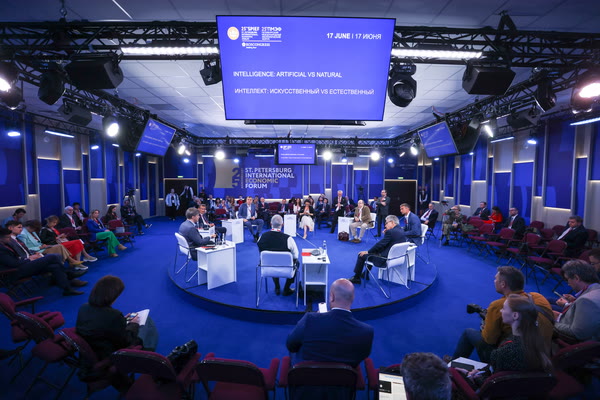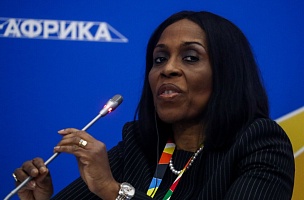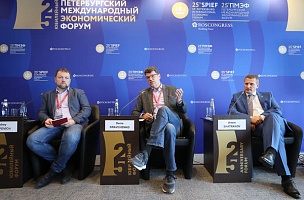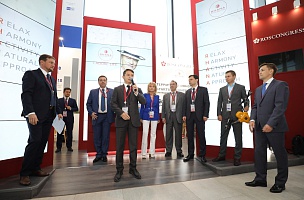Key conclusions
Humans are primary
“Ethics and artificial intelligence are incompatible. But, who knows, now the new generations that are coming into management are more technocratic or something, and perhaps more ready to give in to artificial intelligence,” Russian Academy of Sciences President Alexander Sergeyev said.
“The ethical use of artificial intelligence is what we need to think about. A person must make a decision because he/she is the one who is ultimately responsible for it,” Deputy Director of the Federal Service for State Registration, Cadastre, and Cartography Yelena Martynova said.
PROBLEMS
The concept of ‘artificial intelligence’ as a problem
“Artificial intelligence is a problem that exists and probably needs to be understood as something that is truly on the agenda of all mankind. Why did this problem suddenly arise in the 2010s and become one of the most significant? We began accumulating more and more information. It’s a huge amount, and this data lies around idly, builds up, costs money. And the question is what or who will plough through the data because human intellect is incapable of doing so due to the huge volume of this data. We all recognize that, due to digitalization, we have entered a state where, as with our mineral resource base, there are huge dumps, but we don’t have sufficient resources to pull it all out. And the question has arisen of what we should teach machines so that it can pull out grains from what we have. Neural networks have proven to process better because we figured out that our brain has the same data processing principles. And how can this not be called artificial intelligence? In a certain number of areas, we have recognized that artificial intelligence is better,” Sergeyev said.
"There is a concept of artificial intelligence existing in a strong and weak sense. I don’t believe that there will be strong artificial intelligence. But this does not mean that fundamental science shouldn’t be funded towards this end. Artificial intelligence is not quite the right term. It’s still not quite intelligence. It’s information technology that helps to solve problems that were previously inaccessible,” Ivannikov Institute for System Programming Director Arutyun Avetisyan said.
"Unfortunately, the concept of artificial intelligence was probably not initially translated into Russian quite correctly – the translation meant ‘common-sense reasoning’. This translation, which is not entirely accurate terminologically, has had and continues to have a somewhat negative effect, but this is a conceptual and terminological problem. In addition, the problems of artificial intelligence can be determined by dividing it into strata. First of all, artificial intelligence can be interpreted as a kind of metaphor. Second, as a kind of device that can surpass the results of human intellectual activity in terms of capabilities. Third, it’s a set of technologies that also aims to implement cognitive and other functions. And fourth, it’s artificial intelligence as a separate specific area of research and development,” Russian Association of Artificial Intelligence President Vadim Borisov said.
Difficulties in predicting future AI developments
“If our interaction with artificial intelligence is such that we will be happy, then you and I will be happy that we have such AI, but this does not mean that we will all cease to exist overnight, like natural intelligence. This is a matter of ethics. The meaning of life is not to be happy all the time; the meaning of life also includes suffering. The meaning of life, after all, is a balance between happiness and suffering,” Sergeyev said.
SOLUTIONS
Create systems in a partnership with artificial and natural intelligence
“Artificial intelligence that can be trusted is the most important issue. When can we take its knowledge and put it on the shelf. If we can’t understand how it reached certain conclusions, then such knowledge should not be put on the shelf,” Sergeyev said.
“A smart system is only possible within a partnership because such things as goal-setting, reflection, shaping a unified picture of the world, and adaptation are only possible from the standpoint of formulating this objective,” Borisov said.
Work with data
“As for digital transformation, I would like to talk about a person who does his/her job every day, for example, a registrar. All of you have had to deal with the process of registration actions. Statistics for the past 10 years show that there are about 30,000 employees in state registration offices. About 10,000 of these are state registrars of rights, i.e., people who are criminally liable for the decisions they make. Some 10,000 legal decisions are made every day. Each year, we are seeing an increase. Last year, the volume doubled, while the number of employees decreased by 40%. During the pandemic, we transferred all services to digital format. Registrars learned how to work in a digital format very quickly. It didn’t take much time for a person to figure it out. Our job now is to transform the processes in such a way so that the work of these registrars becomes easier. Nowadays, our consumers perceive any delay in the provision of a service as a non-working service. They think about a service that they want but can’t get. We have developed a programme that will help the registrar make the right decision. We had to process 40,000 contracts just to launch one training programme. To speed up the work of any service, you have to work with data,” Martynova said.






